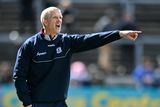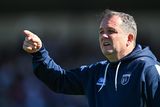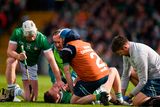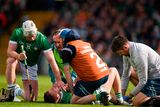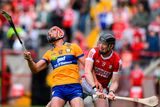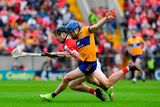Mullane getting out at the top of his game
John Mullane
When John Mullane tossed his Waterford jersey into the Killinan End of Semple Stadium after his county's All-Ireland quarter-final defeat to Cork last July, it didn't seem at the time like a significant moment in one of the great careers in modern hurling.
But clearly it was his own private way of bidding adieu to the loyal support that willed him to every ball in a most eventful 12-year inter-county career, even if the departure papers were only signed off last night.
He had a relationship with the supporters that few players at any level enjoy. Even beyond Waterford, Mullane stirred the hearts of less partisan hurling observers.
When Tipperary humiliated Waterford in the 2011 Munster final in Pairc Ui Chaoimh, it was he who felt most obliged to front up with an apology to those same fans in the immediate aftermath. There were tears in his eyes as he spoke genuinely to the cameras and recorders.
proclaimed
Similarly, after the 2008 All-Ireland final hammering to Kilkenny he stood in the Burlington Hotel on the Monday after the game and proclaimed how the scale of the 3-30 to 1-13 defeat the previous day wouldn't discolour his memory of a first All-Ireland final.
He had been one of the very few Waterford players to stand his ground on a harrowing day for them, but still he could tap into the sense of occasion there had been in Croke Park.
"I'll never forget coming out on that field until the day I die. It was some feeling and I'll take it to my grave. I wouldn't swap the last few months for anything," he said at the time.
They loved him for his emotion and his passion, a passion that would often overwhelm him and sometimes land him in bother, creating a misleading impression of him, especially in his earlier days.
So often after a thunderous score he would turn to the terraces with a pump of his fist or a tug of his jersey that had the reaction of rubbing opponents up the wrong way.
Too often such acts of passion were mistaken for arrogance or the confrontational edge of an angry young man.
Last summer, when Waterford beat a Clare team managed by Davy Fitzgerald, Mullane's reaction was to slide along his knees in front of Fitzgerald in celebration.
Mullane subsequently claimed comments made by Fitzgerald, the previous Waterford manager, to the father of another Waterford player had stoked him all week and this, he would later admit, was his knee-jerk reaction.
But as his career wore on Mullane gained more and more respect. People began to understood the depth of that passion more.
Maybe 2004 was a turning point, when he turned down the opportunity to take a case to the High Court and prevent a one-match ban – for being sent off in that epic Munster final against Cork – from being implemented, earning much kudos in the process.
At the time High Court appeals against GAA suspensions were becoming popular and the previous month the Westmeath footballer Rory O'Connell was cleared to play in the Leinster football final when he was successful with a visit to Inns Quay.
There were no shortage of financial backers for such a move around Waterford as they prepared to play Kilkenny in an All-Ireland semi-final.
But Mullane spurned any potential move, admitting that the suspension by the then GAC was the right one.
"I am happy I didn't pursue the legal route," he said. "At the end of the day, I am a GAA man. You do the crime, you serve the time. The GAC were right. I've no grudges against them. It could have been a lot worse – I could have got three months. I was quite lucky."
Such nobility may well cost him his best chance of an All-Ireland medal, but it regained him a huge swell of support and prompted the then GAA president Sean Kelly to commend him in his programme notes for that game.
Mullane is getting out at the very top of his game. Waterford may be a distant fifth, or even sixth, now in hurling's order of merit, but the quality and form of their star forward is reflected in his presence on each of the last four hurling All Star teams.
Not even Henry Shefflin or Tommy Walsh, the most decorated hurlers in terms of such recognition, can match that feat over this period.
The sight of him sprinting out from the right corner of Semple Stadium or Croke Park, gathering possession and swinging a spectacular score over his right shoulder has been an iconic image of the hurling summer over the last decade since his breakthrough in 2002.
In all he scored 15-133 in 49 championship matches for Waterford, a remarkable return, given that he was never his team's regular free-taker.
He scored in every one of his last 22 championship matches, dating back to the 2007 All-Ireland semi-final against Limerick, one of only three in which he was held scoreless.
Inevitably, there will be questions as to why a player in such a rich vein of form has taken the decision now to retire and it places the spotlight back on Waterford and the level of ambition there is for their hurlers at the moment.
At 31, Mullane clearly has much left to give, but has been angling to get out since this time last year, when he took a break from collective training for six weeks.
With their midfield pairing, Stephen Molumphy and Philip Mahony, unavailable for the coming season and the prospect of the veteran Tony Browne joining Mullane in retirement, this weekend Waterford are potentially slipping into a dark and difficult period.

